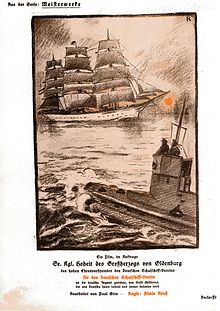Two blue boys
| Movie | |
|---|---|
| Original title | Two blue boys |
| Country of production | Germany |
| original language | German |
| Publishing year | 1917 |
| length | 75 minutes |
| Rod | |
| Director | Alwin Neuss |
| script | Paul Otto |
| production | Erich Pommer |
| camera | Carl Hoffmann |
| occupation | |
| |
Two blue boys , subtitle: Film depicting the war adventures of two German ship boys from the training ship of the German Training Ship Association "Großherzog Friedrich August" is a German feature film that was shot on the sailing training ship Großherzog Friedrich August on behalf of the German Training Ship Association in 1916/17 .
action
At the beginning of the film, the Grand Duke of Oldenburg and the board of the school ship club appear.
In the spring of 1914, Erich and Hans registered as cabin boys on the sailing training ship Grand Duke Friedrich August . In summer they go on a training trip to the Mediterranean by ship . When the First World War broke out on August 1, 1914, the weather conditions forced the training ship to sail close to land off the North African coast. A commander in a French colony traps the ship, so that Eric and Hans are captured by the French.
With the help of the German Foreign Legionnaire Bourger, the two are able to escape from captivity. While fleeing through the desert, they are pursued by other foreign legionaries, but eventually they meet Senussi who are allies of the Ottoman Empire . The Senussi Sheikh initially considers them to be English . When he realizes that they are German, he is ready to lead them into Ottoman territory.
It comes to a battle with English troops, in which unexpectedly a German aviator appears who intervenes with a machine gun . The English flee and the plane lands. The machine gunner is Kurt Frank, Hans' brother. Hans and Erich get into the plane and fly to Constantinople , where they land on a German field airfield and are greeted by German soldiers and officers.
During a tour of the city, they learn that the training ship has entered the port where Hans' father, who is now a hussar officer, is. Father Frank is talking to the captain. Here the film breaks off.
Production history, whereabouts
The film served as an advertisement for the German School Ship Association and at the same time for war propaganda. According to the censorship card, Captain Dreßler, Grand Duke Friedrich August and the board of the school ship club appear in the film themselves. He was in the penultimate week of February 1918 in Oldenburg Apollo - Movies listed. He was mentioned positively in a short report in the news for town and country of February 25, 1918; apparently because the princesses Ingeborg and Altburg, the two youngest daughters of Grand Duke Friedrich August, were in the performance:
The film "Zwei Blaue Jungs" (Two Blue Boys) has been playing in the Apollo Theater since Friday, a real German sailor film that is very well received. On Saturday afternoon our princesses and their entourage took part in the demonstration in the midst of the school youth. The film stays on the schedule through Thursday, which also includes some other good stuff. The visit is highly recommended.
As far as is known so far (as of 2013), only a six-minute fragment from the end of the film has been preserved, which is in the Federal Archives Filmarchiv in Berlin.
- First performance: Palast-Theater am Zoo on November 24, 1917 (later UFA-Palast am Zoo ).
- The prologue at the world premiere was performed by Dr. Rudolf Presber (1868–1935) spoken
- Production: Decla-Film-Gesellschaft, Berlin.
- Censorship: November 24, 1917, Der Polizei-President, Dept. VIII, Berlin, exam number 41260.
criticism
The staging by Alwin Neuss is remarkable, who not only created excellent pictures of German sailor life, but was also able to create wonderful desert scenes that were amazingly true to nature. The main roles are in the hands of the humorous Lambertz-Paulsen and other popular Decla actors.
The film. Journal for the General Interests of Cinematography , No. 48/1917, p. 37.
Trivia
Since no training trips could be carried out due to the war conditions in the North Sea, the training ship had been in service in the Baltic Sea since 1914 . The shooting on board took place in the summer of 1917.
literature
- Gerhard Eckardt: The sailing school ships of the German School Ship Association. A documentation , Bremen 1981.
- Conference of the German School Ship Association in Berlin, Adlon , in: News for City and Country of November 27, 1917.
- Short note about the performance in the Apollo Cinema in Oldenburg on February 25, 1918; ibid.
- Gerhard Wiechmann: "Two blue boys": A "real German sailor film" as an unusual example of film propaganda in World War I , in: Katrin Orth / Eberhard Kliem (ed.): Yearbook 2013 of the German Society for Shipping and Marine History , Oldenburg 2014 , Pp. 103-119. ISBN 978-3-7308-1057-6
Web links
- Two blue boys in the Internet Movie Database (English)
- Movie poster in the Imperial War Museum , London
- Still photo at filmportal.de. Captain Dreßler on the left, Father Franke on his right in field gray hussar uniform
- Fragment from "Two Blue Boys" , filmportal.de

